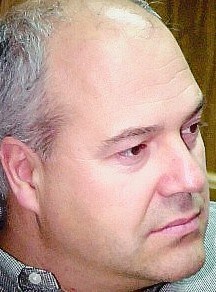The cost of coal is going to take a bite out of Algoma Steel profits in the next quarter and beyond, says President and Chief Executive Officer Denis Turcotte.
Speaking to reporters yesterday, Turcotte said that the Sault steelmaker will pay about $15 million more a quarter for coal from now until the foreseeable future.
"Our major coal supply agreement is with a company that just recently has given us indication that they will not meet their commitments for the coming year by a significant amount," Turcotte said.
"That contract price we have with them is significantly below the current rates we have to replace that coal at."
ASI has been buying most of its coal for many years from a firm based in the Virginia-Kentucky area, but the supplier's reliability has been steadily declining in recent years.
"Their track record is not stellar," said Turcotte. "If we met our deliveries with General Motors the way that they've met with us, GM would have dropped us."
The firm, which Turcotte didn't name, told him that it can't man the mine that ASI's coal comes from so it can't meet its commitments.
Turcotte said that ASI's long-term relationship with the firm has made it reluctant to completely abandon it, but the problems have become quite chronic and severe.
"Maybe it's time to look at a change for the next contract (in 2006)," said Turcotte.
Surplus of cash
He also said that Algoma shareholders need not worry about profits from the formerly cash-strapped mill.
"We are sitting with a surplus of available cash that has to go back to the shareholders," he said. "Our intent is to repay our $160 million note indenture in January and we still will have surplus cash."
He said returning capital to Algoma's investors is the logical next step after choosing not to sell the steel mill.
On Wednesday, the company declared a special dividend of $6 per share.
No longer looking for a buyer
Turcotte said yesterday that no one came forward with an expression of interest anywhere near what he and the ASI board felt the mill was or would be worth, so they stopped looking for a buyer.
"If somebody comes in and offers you what you feel to be, using the best judgments of the time, substantially below the potential value of that business, you don't sell it if you don’t need to," said Turcotte. "And we clearly don't need to [sell it on the cheap]."
With Algoma's past reputation of financial instability, Turcotte said he believed some propsective buyers were approaching the sale with the idea of getting a bargain.
He also said that the slight downturn in the steel market seems to have put potential buyers in a conservative mindset.
'A public company is always for sale'
But Turcotte hasn't quite thrown our his 'for sale' sign yet.
"A public company is always for sale," he said.
He said he believes some potential buyers have adopted a "wait-and-see" attitude and they are going to continue to see good things at Algoma Steel Inc.
"We're in a different world. 20 or 30 years ago the notion of a company actively looking at inducing a sale wasn't really talked about, it wasn't done," said Turcotte. "But in today's world the way the capital markets are truly open for business, shareholders expect that companies actively drive the maximization of shareholder value."
Production improvements
Another way that Turcotte sees Algoma Steel maximizing shareholder value is by increasing production, but this would have little effect on actual number of jobs in the mill, he said.
"They're the kinds of production changes that don't materially affect employment levels," said Turcotte. "If anything, as we've said all along, we believe that, over time, employment levels will continue to go down."
He said that changes to steel production in Algoma will mean that gradually it will take fewer workers to produce more steel.
Turcotte said he believes the company will be able to continue to make any needed reductions in the workforce with attrition. "We have in excess of $180 million of improvements [production] that could be had," said Turcotte.
"Clearly some of those are quite ambitious," he said. "I'm not sure we're going to get the full 180, as a matter of fact, I think it's unlikely we'll get the full 180 but if you remember initially we had set out to achieve $100 million run-rate of improvement within a three-year period."
"We've broken through a $130 run-rate in about two-and-a-half years," said Turcotte.
He said some people in the mill believe they could take production as high as 300,000 tonnes per year of incremental production.
He, on the other hand, was a bit more conservative.
"We know, based on preliminary analysis and I feel highly confident, that we could achieve 150 to 200 thousand tonnes per year."
